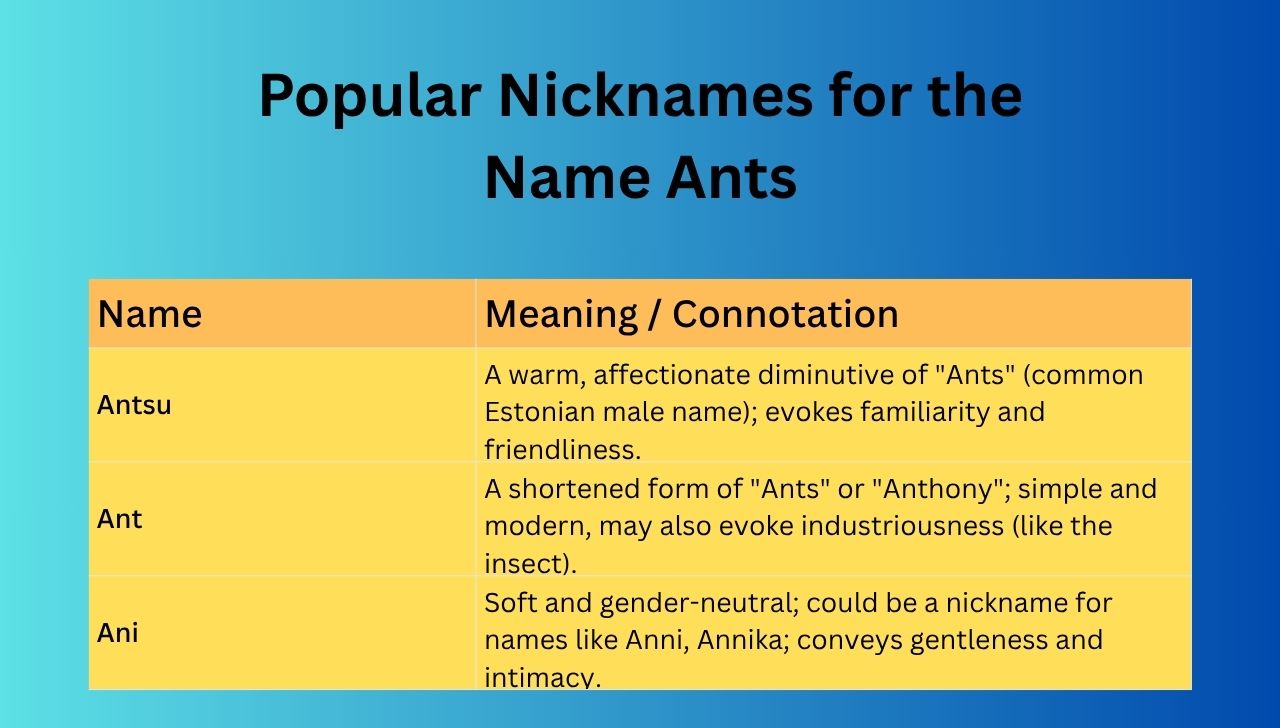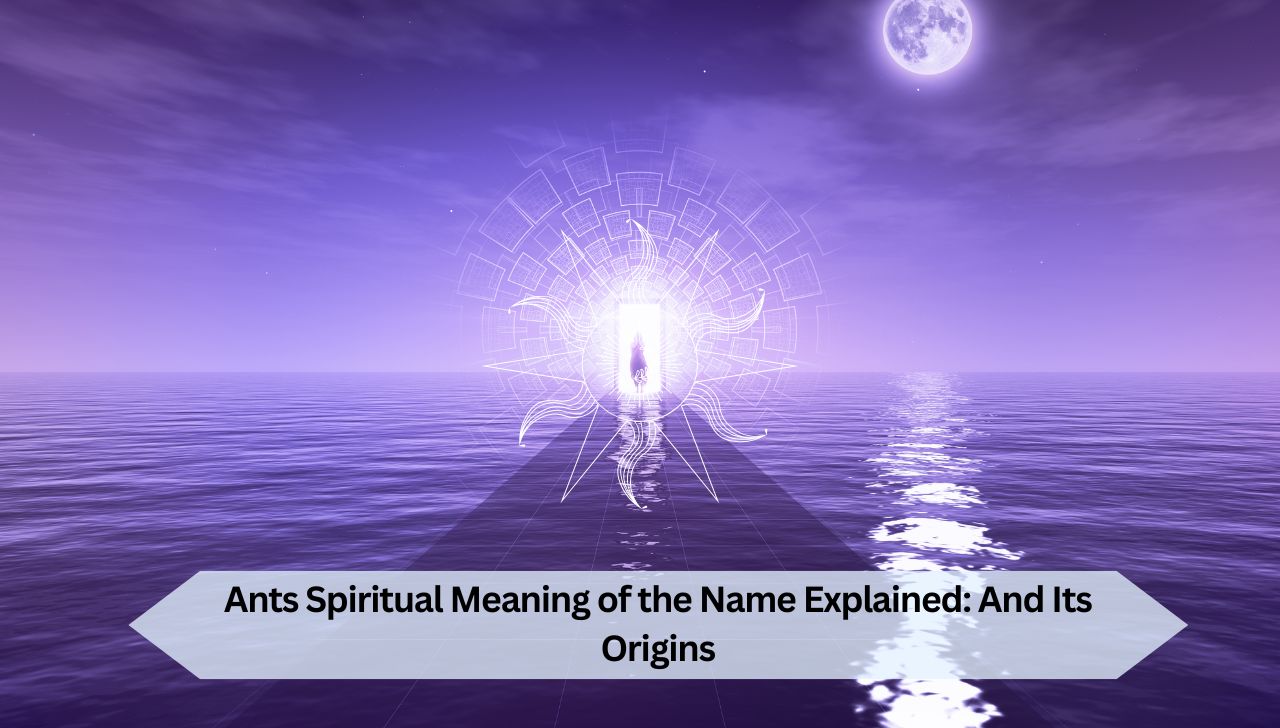Names carry more than just identity—they carry stories, histories, energies. One such name that stirs curiosity is “Ants.” Though it may seem uncommon at first glance, it’s steeped in meaning, tradition, and a surprising amount of spiritual depth. Let’s take a journey through its origins, spiritual significance, and cultural echoes.
What Does the Name Ants Mean? A Definition
The name “Ants” is a masculine given name, primarily found in Estonia. It might raise an eyebrow for English speakers—after all, it sounds identical to the plural of a tiny insect. But linguistically, it’s not related to insects at all. “Ants” is the Estonian form of “Hans,” which is itself a shortened form of “Johannes,” meaning “God is gracious.”
So, at its core, the name Ants carries a message of divine benevolence. It reflects humility, grace, and a quiet strength—the kind of strength that doesn’t clamor for attention but anchors those around it.
Origin of the Ants Name
Tracing its roots, “Ants” originates from Northern Europe, particularly Estonia. As a derivative of “Hans,” which in turn stems from “Johannes,” it carries a layered lineage. Johannes is a Latin form of the Greek name “Ioannes,” derived from the Hebrew “Yochanan.”
Yes, that’s quite the linguistic journey.
The Hebrew origin, Yochanan, combines “Yo,” a form of Yahweh (God), and “chanan,” meaning “to be gracious.” So, by the time it transforms into “Ants” in Estonian, it’s already passed through centuries of cultural adaptation. It’s kind of beautiful, really—like an old tree whose roots stretch across continents and centuries.
Don’t Miss This : Armadillo Spiritual Meaning of the Name Explained: And Its Origins
The Spiritual Meaning of Name Ants
Spiritually, the name “Ants” embodies qualities that are both grounded and divine. Given its roots in “God is gracious,” there’s a strong spiritual undertone of mercy, favor, and divine presence. People with this name are often thought to be dependable, humble, and quietly determined.
In energy or name numerology, Ants can correspond to the number 7, a number associated with introspection, spiritual awakening, and deep thinking. Seven is also linked to truth-seeking and a thirst for wisdom. If you know someone named Ants, don’t be surprised if they have a reflective nature or a penchant for asking big questions about life, the universe, and their place in it.
And just as ants in nature symbolize hard work, unity, and perseverance, the name Ants shares those connotations too—albeit symbolically. It’s about quietly building, contributing, and living with purpose.
Ants Name Meaning in the Bible
You won’t find the exact name “Ants” in most translations of the Bible, but its etymological grandfather, Johannes (or John), is deeply rooted in Biblical texts.
John the Baptist, one of the most significant figures in the New Testament, carries this lineage. The name symbolizes a divine messenger—a forerunner. Through that lens, “Ants” inherits a spiritual resonance associated with truth-telling, humility, and divine mission.
Moreover, in Proverbs 6:6, ants are mentioned: “Go to the ant, you sluggard; consider its ways and be wise!” While this refers to the insect, it subtly links the name with qualities of diligence and wisdom in biblical literature. It’s a curious overlap, but one that adds flavor to the spiritual profile of the name.

Popular Nicknames for the Name Ants
Because “Ants” is already short and distinct, it doesn’t lend itself to too many nicknames. But hey, we humans love to get creative.
Some common or affectionate variants might include:
| Name | Meaning / Connotation |
|---|---|
| Antsu | A warm, affectionate diminutive of “Ants” (common Estonian male name); evokes familiarity and friendliness. |
| Ant | A shortened form of “Ants” or “Anthony”; simple and modern, may also evoke industriousness (like the insect). |
| Ani | Soft and gender-neutral; could be a nickname for names like Anni, Annika; conveys gentleness and intimacy. |
| Tsi | Playful, modern-sounding; has a unique, catchy vibe—feels light and creative. Possibly an abstract or stylized diminutive. |
| Hans | Traditional and strong; references Estonian and broader Germanic heritage. Feels classic and reliable. |
Depending on the region or personal preference, nicknames often evolve naturally, sometimes bearing little resemblance to the original name. But these versions keep things cozy and personal.
Don’t Miss This : Stella: Meaning, Origins, and the Story Behind the Name
Ants Name Meaning in Hebrew
As we touched on earlier, the name Ants traces back to the Hebrew “Yochanan.” This name is deeply meaningful in Hebrew culture, comprising two elements:
- “Yah” or “Yo”: A reference to Yahweh, the sacred name of God
- “Chanan”: Meaning grace, mercy, or compassion
So, Yochanan literally means “Yahweh is gracious.”
This name appears multiple times throughout the Old and New Testaments. Its spiritual meaning emphasizes God’s unearned favor and loving-kindness. The essence of the name is about receiving divine love, not because it’s earned, but because it’s given freely. Ants, by extension, shares this beautiful, hopeful undertone.
Conclusion
At first glance, the name “Ants” might seem quirky or unfamiliar, especially to non-Estonians. But peel back the linguistic layers and what you find is something deeply meaningful. It’s a name that stretches from modern Estonian soil all the way back to ancient Hebrew roots.
It speaks of grace, strength, humility, and quiet determination. And in a world that often rewards loudness and flash, a name like Ants reminds us that there is great power in stillness, deep roots, and the quiet work of building something lasting. So if you or someone you know carries the name Ants, know this: it’s more than just a name. It’s a whisper of divine grace wrapped in centuries of human history and spiritual insight.

Cala Joy is a wellness coach, breathwork facilitator, and passionate explorer of heart-centered living. Her articles focus on emotional healing, energy alignment, and creating a life led by love and intuition.

